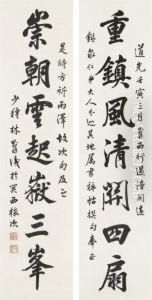Lin Zexu Paintings
Lin Zexu was a prominent Chinese scholar and official during the Qing dynasty, best known for his vigorous opposition to the opium trade in Guangzhou (Canton) prior to the First Opium War (1839–42) between Britain and China. Born on August 30, 1785, in Fuzhou, Fujian province, Lin was a distinguished scholar who passed the highest level of the imperial examinations in 1811, propelling him into a series of governmental positions.
Throughout his career, Lin demonstrated a strong commitment to the welfare of the people and the strength of the state. His dedication and hard work led him to be appointed as the Imperial Commissioner by the Daoguang Emperor in 1838, tasked with eradicating the opium crisis plaguing China. At the time, opium imported by British merchants had become a significant social and economic problem, leading to widespread addiction, social decay, and the outflow of silver from China, weakening the country's economy.
Lin arrived in Guangzhou in March 1839 and immediately took rigorous steps to suppress the opium trade. He enforced strict regulations, confiscated and destroyed over 20,000 chests of opium, and demanded that foreign merchants sign a bond promising not to deal in opium under penalty of death. Lin's actions, however, exacerbated tensions between Britain and China, contributing to the outbreak of the First Opium War. Despite his efforts, Lin was made a scapegoat for the war and was exiled to Xinjiang.
In his later years, Lin Zexu continued to serve the Qing government in various capacities, including governor of Yunnan and Guizhou provinces. Despite his fall from grace, he remained a respected scholar and official, known for his integrity, administrative competence, and staunch resistance against foreign intervention and opium. Lin Zexu passed away on November 22, 1850, in Chaozhou, Guangdong province. He is remembered in Chinese history as a symbol of resistance against foreign aggression and a pioneer in the fight against drug addiction. His legacy is commemorated in various ways, including the annual observance of International Anti-Drugs Day in China on June 3, marking the day Lin Zexu destroyed the opium in Humen.




